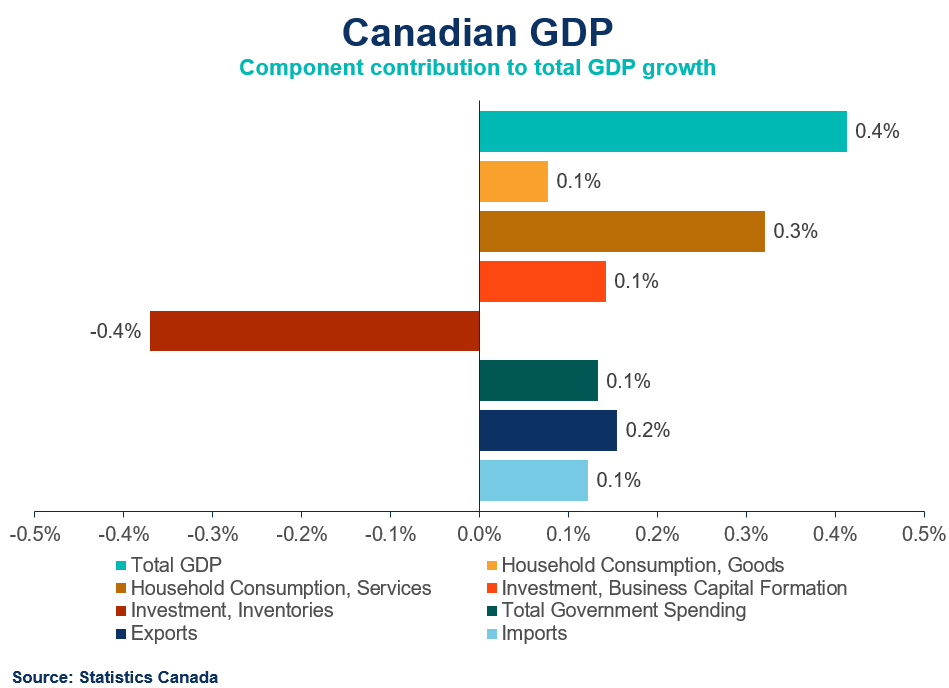Blog /
Q1 2024 GDP: Solid GDP growth undershoots Bank’s high expectations
The Canadian economy grew at a slower pace than anticipated in the first quarter, despite stronger consumer spending and renewed investment growth following previous declines.



Andrew DiCapua

The Canadian economy grew at a slower pace than anticipated in the first quarter, despite stronger consumer spending and renewed investment growth following previous declines.
With fourth quarter GDP revised downward, overall growth is weaker than the Bank of Canada’s recent forecast. However, stronger domestic demand might prompt the Bank to hold off on policy changes, as April GDP is expected to grow modestly, supported by positive hours worked and retail sales. This puts the Bank in a tough spot, but with moderating inflation and tepid growth, there are many reasons to consider a rate cut in June.
Andrew DiCapua, Senior Economist, Canadian Chamber of Commerce
KEY TAKEAWAYS
Headlines
- Canada’s real gross domestic product (GDP) grew by 1.7% annualized in the first quarter, posting weaker than expected growth than markets expected (+2.2%). The fourth quarter 2023 GDP growth rate was revised down as well from previously 1% to 0.2% annualized. The first quarter of 2024 was driven by stronger household spending (+0.7%).
- Monthly GDP by industry was flat in March, in line with expectations and the flash estimate. Statistics Canada projects a stronger 0.3% growth in April.
Movers and Shakers
- Exports of goods and services rose 0.5%, driven by increased exports of precious metals and other commodities. Lower trade of passenger vehicles and crude oil softened the net trade contribution to growth. Conversely, imports edged up 0.4%.
- Final domestic demand (which includes expenditures on final consumption and gross fixed capital formation) grew by 0.7% in Q4, outpacing overall GDP growth of 0.4%.
- Household spending increased by 0.7%, primarily due to higher spending on services like rent, telecommunications, and air travel. Goods spending was supported by new trucks and utility vehicles. Per capita consumption reversed its decline in recent quarters, rising slightly possibly indicating an upward trend as population growth slows.
- Housing investment increased by 0.3%, sparking new housing construction growth. Business investment reversed its decline and grew at a solid pace (+0.8%) in the first quarter on engineering structures in the oil and gas sector. Stronger investment growth in machinery and equipment (+1.6%) also boosted Q1 GDP.
- Investment in inventories was a drag on GDP growth, declining 0.4% in Q1 as businesses across most sectors limit inventory growth.
- The household saving rate reached its peak in nearly two years at 7% in Q1, as households use high interest rates to park their cash.
OUTLOOK AND IMPLICATIONS
- With decent first-quarter growth, the Canadian economy seems to be on solid footing with a strong rebound in final domestic demand. April’s flash estimate of 0.3% m/m positions second-quarter GDP to grow around 1.9% on an annualized basis, stronger than the Bank of Canada’s April forecast of 1.5% growth in Q2. With per capita consumption on an upward trend, further insight into the strength of the consumer will unfold in the coming months. Stronger hours worked in the April Labour Force Survey and retail sales estimates point to a good start to the second quarter.
- Even though the Bank of Canada has many reasons to begin lowering interest rates and declare mission accomplished amid the backdrop of inflation moderating to target, their data dependency could hold them back from a rate cut next week. We believe interest rates are in such a restrictive position that the Bank has little evidence to support holding. Markets are pricing in a June rate cut as near certainty potentially moving the Bank’s hand to lower rates at a slow and measured pace to sustain growth.
SUMMARY TABLE

Other Blogs

Jul 03, 2025
Merchandise Trade May 2025: Headline rebound masks underlying softness

Jun 27, 2025
April 2025 GDP: The shoe drops as the economy shows trade impacts.

Jun 24, 2025






